Description
CHAPTER ONE
INTRODUCTION
BACKGROUND TO THE STUDY
This research is on an investigation into the role of united nations peace support operation to security of Africa: a case of Darfur-Sudan. The Charter of the United Nations (UN) is clear in its commitment to international peace; Chapter I, Article 1, states that it is “to maintain international peace and security, and to that end: to take effective collective measures for the prevention and removal of threats to the peace and for the suppression of acts of aggression or other breaches of the peace…” The purpose of the UN therefore, is the maintenance of international peace and security. Michael Howard (1966:149) defines peace as “the maintenance of an orderly and just society: orderly in that man is defended against the violence or extortion of his neighbour, and just in that he is defended against the arbitrary violence or extortion of his rulers.” Applying this definition to the international realm, would imply that international peace and security is dependent on both international order and justice. Certainly, the original conception of international peace and security in 1945, by the founders of the UN as stated in the Charter was “to save future generations from the scourge of war…and to establish conditions under which justice and respect for the obligations arising from treaties and other sources of international law can be maintained.”
In establishing the Charter, the founders of the UN hoped to avoid the breakdown of international order which led to the two World Wars of the twentieth century and subsequent destructions, death and human suffering. Fundamental in the Charter are the cardinal principles of sovereignty, non- intervention and non-use of force which call for states to respect the sovereignty of other states, refrain from interfering in the internal affairs of other states and from the use of force to resolve interstate disputes respectively. The first two principles were not new in 1945; since the Treaty of Westphalia in 1648, they had been regarded as vital pre-requisites for international peace and security. However, what was new in 1945 was the construct for enforcing these principles, i.e. the UN, and the agreement to “outlaw war as a means of [state] policy” (Prantl and Kranso, 2004:312).
Also, events that preceded the drafting of the UN Chapter, particularly emerging evidence of the Holocaust by the Nazi regime shocked the world. This informed the provisions for the respect of human rights in the Charter, but not without significant debate. The charter was primarily focused on collective action to deter aggression rather than address individual wellbeing and suffering. At the time of its ratification, the UN Charter clearly privileged international order over individual justice and as Prantt and Kranso (2004) observes, “it would seem that the great powers never intended to enforce these moral considerations”.
Since the formation of the UN, the world has witnessed intermittent periods of relative peace without major global conflict though Africa has experienced increase in inter and intra-state wars with high casualty. This led to several peacekeeping and peace enforcement operations in the region. The challenges of these Peace Support Operations (PSOs) in Africa are immense and the UN has not lived up to expectation due to the complex nature of Africa conflicts which are mostly intra state. A key question for the international community therefore, is “can a self-sustaining and lasting peace be constructed in societies torn asunder by war or gross violations of human rights?” (Price and Zacher, 2004:18).
The challenge for the UN as an institutions is how to adapt its roles, functions and structure in a modern society? This is considering the increase in demand for the UN to respond to varied challenges including „failed‟ states, human rights abuses and humanitarian crises. Intervention into such situations raised significant questions not only on the issues of „human security, but also on the „limits of state sovereignty in a “post-Westphalian” order‟ (Price and Zacher, 2004:142). On one hand is the „right‟ that a state can take actions within its own borders without external interference, whilst on the other, is the question of how the UN should “respond” if that state is either unable or unwilling to protect its own people. This question is most apt to the conflicts in Africa particularly the Mano River Union, Horn of Africa, Great Lakes region and the Darfur Crisis.
The prevalence of conflicts in Africa has been on the increase since the end of the Cold War around 1990. This has undermined the quest for sustainable development in the region owing to the widespread destruction of life and property. After the Cold War,conflicts have emerged in Liberia, Somali, Sierra-Leone, Democratic Republic of Congo, Sudan, Rwanda, Chad, Djibouti, Eritrea-Ethiopia and Burundi among others. Introducing the organization of African Unity (OAU) now African Union (AU) Mechanism for Preventing, Managing, and Resolving Conflicts to the OAU Council of Ministers at Dakar, Senegal, in 1992, the then General Secretary, Salim Ahmed Salim, emphasized that:
Conflicts have cast a dark shadow over the prospects for a united, secure and prosperous Africa which we seek to create…. Conflicts have caused immense suffering to our people and, in the worst case, death. Men, women and children have been uprooted, dispossessed, deprived of their means of livelihood and thrown into exile as refuges as a result of conflicts. Conflicts have engendered hate and division among our people and undermined the prospects of the long- term stability and unity of our countries and Africa as a whole. Since much energy, time and resources have been devoted to meeting the exigencies of conflict, our countries have been unable to harness the energies of our people and target them to development (OAU, 1992:15).
Similarly, the former AU Chairperson Dlamini Zuma while commenting on conflicts in Africa during the 28th Ordinary Session of the Assembly of Heads of State and Government of the AU (Summit) in Addis Ababa, Ethiopia on 31 January 2017 stated: “we cannot sustain peace without development, and very often poverty and failure to manage the expectations of population is the root cause conflicts in Africa (Zuma, 2017).
These conflicts are driven and underpinned by the proliferation and use small arms and light weapons, which led to increase in organized crime, banditry and cross-border activities. This is as alluded by President Lungu of Zambia during the AU Peace and Security Council Retreat in Lusaka 2016:
As we all know the growing availability of small arms in post conflict situations has been and still remains a major factor in the rapid upsurge in the number of conflicts. This has had the effect of not only hindering socio-economic development, but creating humanitarian crisis environmental degradation and increased poverty on the African Continent.
Proliferations of small arms have helped create enabling condition for the emergency of religious extremists and terrorism as seen in Somalia and Mali. Though internal, most of these conflicts undermine the security of neighboring countries and cause regional instability despite the presence of UN Peacekeepers (Mano River Union and Great Lakes Region) while in some cases they undermine border security as seen in Darfur along the borders with Chad, CAR, South Sudan and Libya. This has undermined political and socio-economic development of the region as the quest for enduring peace remains elusive.
The UN is at the apex of institutional frameworks designed for conflict management and resolution aimed at the maintenance of international peace and security. Broadly speaking, the raison d‟être of the UN lies in the minimization of conflict and maximization of cooperation. This has seen the UN deploy about 100,000 uniformed peacekeepers and 15,000 civilians in 9 peacekeeping mission in Africa as at 2016 (UN HQ, 2016). The mandates of these missions in Africa like in other parts of the world are very broad as it includes civilian protection, humanitarian operations and counter insurgency operations among others. At the regional level, Inter-Governmental organizations such as the AU also have mechanisms for conflict resolution and management. As at 2016, the AU leads a peacekeeping mission of more than 22,000 troops and police in Somalia, known as AMISOM. However, the viciousness of the Darfur conflict has raised vital questions concerning the will, effectiveness and capability of these organizations particularly the UN to deal with armed conflicts in Africa. The Commission for Africa acknowledged that much more must be done to prevent and resolve conflicts in Africa if development in the continent is to accelerate (Grono, 2006). Thus, the on- going conflict in Darfur presents the AU and the UN with a challenge to back their pronouncements with action and demonstrate a resolve to provide enduring solution to enhance African Security.
The conflict in Sudan (south Sudan and Darfur) is complex as the country has been at war since independence in 1955. These wars and open conflict are caused by the lack of development due to historic marginalization. Sudan has been ruled since independence from Khartoum by a small group of predominantly Arab/Muslim elite hailing principally from the Nile River Valley in central Sudan, and successive governments in Khartoum have either ignored the peripheries or sought to suppress them militarily. As a result, Darfur in the West is the, poorest and underdeveloped of the country.(Ihekire, 2007). These conflicts have left several million people dead and displaced as well as the environmental degradation of the region which is of serious concern to the international community.
The conflict in Darfur which is the crux of this thesis has been discussed by several scholars and the background covered in great details by the Report of the International Commission of Inquiry on Violations of International Humanitarian Law and Human Rights Law in Darfur (2005) and Report of the High Level Mission on the Situation of Human Rights in Darfur Pursuant to Human Rights Council Decision S4/101 (2007) among others. The roots of the conflict are complex and the belligerents contest the controlling narrative. Regardless of rights and wrongs, questions of the responsibility to protect and proportionality would emerge, however, most would agree with France‟s description of Darfur in the Security Council in July 2007, that it is, or at least was at that time, a “synonym for despair, distress and violence”(UN Doc. S/PV.5727, 31 July 2007,5). The Darfur crisis has led to the death of about 200,000 people and the displacement of about 2,000,000 others. The American Government “concluded that genocide has been committed in Darfur….”(Powell,2004). Similarly former President of Nigeria Olusegun Obasanjo described what happened in Sudan as “genocide” (Obasanjo, 2006). The UN called it the world’s worst humanitarian disaster, even though it failed to intervene in the conflict as quickly as expected.
The rebellion in Darfur against the Government of Sudan began in 2003 with ethnic and tribal overtones. Khartoum, through the use of air platforms particularly helicopter gunships and Janjaweed militia proxies in the region, has sought the Arabization of the entire Sudan including, predominately black African Darfur. This was opposed by the Sudan Liberation Army/Movement (SLA/M) and the Justice and Equality Movement (JEM). The ensuring conflict led to the Humanitarian Ceasefire Agreement signed in N‟Djamena on 8 April 2004. The Agreement signed by Sudan, SLA/M and JEM was facilitated by the Chadian President Idriss Derby. It provided for a ceasefire and the obligation of the parties to ensure access for humanitarian purposes, refrain from recruitment, supply of arms and ammunition and violence against civilians(Human Right Watch, 2006). It also called for a ceasefire commission to monitor compliance.
The Ceasefire Commission was subsequently established, with a number of sub bodies, each of which exercise specific functions: the AU Monitoring Mission, a Chief Military observer tasked with exercising command and control, and military observers. The AU Mission in Sudan was thus deployed but found itself overwhelmed with too few personnel and lack of logistics support. This informed the transition from AMIS 1 to AMIS 11 in October 2004 and AU Peace and Security Council request for increased military personnel and a civilian police presence. While these numbers were increased on paper in 2005to 3,320 personnel, implementation on the ground proved to be both slow and stunted as AMIS never reached full operating capacity as at April 2005 as only 2,200 of the full capacity of 3,320 were on the ground (HRW, 2006).
At the same time that AU was renewing its commitment in Darfur, the UNSC began to assert itself more fully in Darfur, in the light of what it described as the “deterioration of the security situation and the negative impact this has had on humanitarian assistance efforts” (SCR 1590,24 March 2005). The SCR 1590 established the UN Mission in Sudan (UNMIS) with 10,000 military personnel and 1000 civilian police officers. UNMIS was to coordinate with AMIS towards ensuring peace in Darfur. SCR 1706 significantly expanded UNMIS‟s mandate in 2006 to include deployment in Darfur and increased the strength to 17,300 military personnel and 3,300 police personnel (SCR 1706, 31 August 2006). UNMIS was also tasked to support the Humanitarian Ceasefire Agreement, work to implement the Darfur Peace Agreement, monitor the movement of armed forces in Darfur, investigate ceasefire violations and maintain presence in IDP Camps. SCR 1706 also authorized UNMIS to „use all necessary means‟ thus crossing over to Chapter VII of the UN charter. Despite these efforts by UN and AU, not much was achieved as Darfur was characterized with continual violence and insecurity. Civilians, UNMIS and AMIS personnel were attacked while humanitarian workers were abducted (Report of UNSG on Darfur, 2007).
The situation led to the transition from AMIS, with the assistance of UNMIS to a hybrid peacekeeping force. SCR 1769 established the hybrid force, the African Union/United Nations Hybrid operation in Darfur (UNAMID), with the consent of Sudan, the same state that has stood accused of having committed genocide in Darfur. SCR 1769 anticipated up to 20,000 military personnel and a few thousand police officers for UNAMID. The mandate of UNAMID encompassed good offices and support for the peace process, ensuring security, prioritizing the rule of law, human rights and governance and providing humanitarian assistance. Despite the huge resources and chapter VII mandate, not much has been achieved as the security situation remain precarious while the UN considers an exit strategy.
Herein lies the interest of this thesis on Darfur as the concept of a hybrid force as seen in UNAMID is a novel concept in peacekeeping first introduced in Darfur and was expected to achieve immediate results. The workability of the concept thus requires close examination likewise the potential of enhancing African Security through UN PSOs. Also, the interest in Sudan and Darfur particularly is primarily due to the fact that Sudan has been in conflict since independence, defying all conflict resolution mechanism deployed by the UN, AU and the former OAU in the search for solution. The complex nature of the crisis provides a good challenge to peacekeeping and conflict resolution scholars.
STATEMENT OF THE RESEARCH PROBLEM
The conflict situations in Africa which undermine African security and the inability of PSO to provide enabling environment for enduring solution remain a great challenge to African governments and the UN. Since the end of the Cold War, peacekeeping has become central to the international community’s response to many violent conflicts including those in Africa. Examples in Africa include UNMIL in Liberia, UNAMSIL in Sierra Leone, UNOSOM in Somalia, UNMIR in Rwanda, MUONC in Congo, ONUMOZ in Mozambique, MINUSMA in Mali and AMIS/UNAMID in Sudan. Peacekeeping is thus seen as an important instrument of positive conflict transformation among scholars and practitioners. This underpins the large deployment of PSOs in Africa as an instrument of conflict resolution. Currently, as at 2017, the UN has 9 peacekeeping mission in Africa, AU has one while ECOWAS has a small UN recognized mission in Guinea Bissau.
UN PKOs have had mixed result in Africa unlike in other parts of the World which have had remarkable successes as in Timor Litse, Haiti and so forth. The few successes recorded in Africa were underpinned by ECOWAS operations as was the case in Liberia and Sierra-Leone. Current missions in DRC, Mali, South Sudan and Darfur have not adequately improve security and socio-political development. This is considering that successful peacekeeping missions are tied to an effective political strategy, clear goals and expectations, well trained and equipped troops as well as adequate funding. According to Gowan, “over the longer term, peace operations tend to succeed where they have clear political strategies for bringing old enemies together without a political strategy even a significant military deployment will lose traction over time” (Gowan, 2008 P.32).
This thesis seeks to analyze the inability of UN PSOs to provide conducive environment to adequately resolve Africa‟s conflicts leading to re- emergence of such conflicts on withdrawal of peacekeepers. The study will therefore determine the efficacy of UN PSOs in resolving contemporary conflicts in Africa using the conflict in Darfur Sudan as case study.
- RESEARCH QUESTIONS
In specific, this research will attempt to provide answers to the following research questions:
- Why did the UN intervene late in Darfur conflict?
- What are the challenges to effective and efficient UN PSOs in Darfur-Sudan?
- Why has UNAMID not been able to provide enabling environment to ensure enduring solution to Darfur conflict which would positively enhance the security
- What are the challenges to the successful execution of UNSC PoC Mandate in Darfur.
- Did some P5 oil and other natural resources interest in Sudan hinder effective UN collective action in Darfur conflict?
OBJECTIVES OF THE STUDY
There are five specific objectives for this study, viz:
- To determine why the UN intervened late in Darfur
- To establish the challenges to effective and efficient UN PSOs in Darfur-Sudan.
- To examine why UNAMID has not provided an enabling environment to ensure enduring solution to Darfur.
- To establish the challenges to the successful execution of UNSC Mandate on PoC in.
- To examine why some P5 members parochial national interest as regards the need for African natural resources (particularly oil) influenced their position on Darfur conflicts thus frustrating the UN collective
RATIONALE OF THE RESEARCH
Several peacekeeping missions have being deployed in Africa but has however failed to achieve the mandates thus suggesting that peacekeepers need enhanced capabilities, more resources and conflict resolution instruments. Inrelation to this, former UN Secretary General Kofi Annan (1997) noted that peacekeepers need new capabilities or what he refers to as “positive inducements” to gain the support of the local population in conflict areas and to be able to achieve the mandate of the mission. Similarly, the UN secretary General Ban Ki-moon while addressing the AU summit in Addis Ababa in February 2010 called for African leaders to be committed towards resolving the conflicts in the region and for UN peacekeepers to develop increased capabilities (BBC, 1 February 2010). This informed increased effort at the UN and AU to make peacekeepers promote durable peace and sustainable development.
The study will therefore, examine the efficacy of UN peacekeeping operation in resolving contemporary conflicts in Africa using Darfur as a case study. Darfur was chosen due to the complex and contemporary nature of the crisis and the inherent challenges they pose to UN peacekeeping frameworks.
This is considering that hybrid peacekeeping is a new concept and practice, hence there are limited policy frameworks and procedure to guide the process. The thesis conducts a detailed inquired on UNAMID operation which will provide clarity on hybrid PSO and aid the development of policy frameworks guidelines and procedures to drive future hybrid missions. The study will also examine the mandates in Darfur, particularly on POC, and the operational capability required for success with a view to ensure that UN mandates are supported by appropriate operational resources to achieve success. This will help address issues of mandate – resources mismatch in most PSO. It will also provide an informed basis to improve UN PSOs as a conflict resolution tool in Africa and also contribute to UN search for new capabilities in the maintenance of international peace and security.
ASSUMPTIONS OF THE STUDY
This study rests upon the following assumptions:
- That enduring and sustainable peace in Darfur can only be achieved with the full cooperation and willingness of the parties to a conflict to end the
- That the inability of UNAMID to sufficiently improve Darfur security situation is not unconnected to their inability to address the root causes of
- That UNAMID would be more effective in Darfur if it fully collaborates with regional and sub regional conflict resolution mechanisms like those of the AU and IGAD in addressing Darfur crisis.
- That the full backing of the P5 and the political will of African governments are necessary to promote durable peace in Darfur which would be anchored on post conflict economic, social and political development.
SCOPE AND LIMITATIONS OF THE STUDY
The research particularly focused attention on the UN PSO in Darfur Sudan, UNAMID between 2007 and 2016. This is considering that the UN took over the mission in 2007 and UNAMID remained one of UN largest mission up to 2016. Most of the data used is from 2007 to 2017. However, the analysis of some of the issues will predate 2007 because of the relevance of history in understanding contemporary issues. The content is limited to the conflict in Darfur though the influence of the North-South conflict (Now Sudan and South Sudan) and the conflicts in South Kodorfan and Blue Nile states of Sudan will also be highlighted. Specifically, attention was paid to the genesis of the crisis in Darfur, the role of the UN in the conflict, PSO activities, achievements, problems and lessons, and the implications to Africa considering the inability of the UN to promote enduring solutions to these conflicts while currently pondering over exit strategy. This research also studied the changing nature of UN PSO emanating from the UN Agenda for Peace, Brahimi Report, UN Guidelines for PSO and the High Level Independent Panel on Peace Operations (HIPPO) while addressing the inherent challenges to change. The research also identified and analyzed the level of regional (AU) cooperation and coordination with the UN in conduct of PSOs in Africa particularly the UN/AU Hybrid Mission in Darfur. UNAMID operations was thus analyzed leading to specific recommendation on PSOs in Africa in general and Sudan- Darfur in particular towards enhancing Africa security.
On the other hand, this research encountered some limitations some of which include methodological issues like the purposive sample used but this was overcome by ensuring that a large number of diverse stakeholders where interviewed which generated variety of perspectives and credible data. The dearth of relevant information on PSOs in Africa, and security concerns during visit to Darfur were other limitations. In any case, the trip to Darfur was made as a soldier and UN Staff rather than as a student which was most helpful. In spite of the above limitations, the research constitutes a basis for valid generalization since it will involve a single case study, well researched, using all available resource materials at the UN HQ New York and UNAMID Darfur.
ORGANISATION OF CHAPTERS
In order to facilitate this research and for the purpose of logical presentation, this research is organized into eight chapters. Chapter One essentially spells out the general background of the study which comprises of the introduction, statement of the research problem, research questions, objectives of the study, assumptions, scope, limitations and the organization of the study. Chapter Two presents a literature review and the theoretical framework of the study. Chapter Three is a detailed presentation of the method of data collection and analysis. Chapter Four presents the evolution and practice of PSOs in the UN. Chapter Five is a presentation on the background of the conflict in Darfur – Sudan and examination of ongoing UN PSO (UNAMID). Chapter Six provides the presentation and analysis of data on UNAMID mandate implementation. Chapter Seven provides a review of the UN‟s ability to meet the challenges of PSOs in Darfur. Chapter Eight provides summary, conclusion and recommendations.

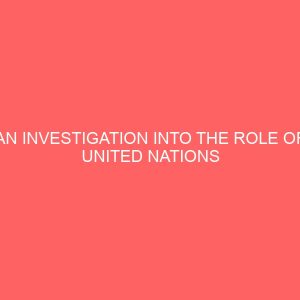
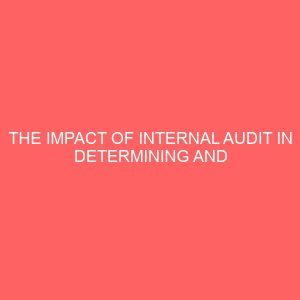
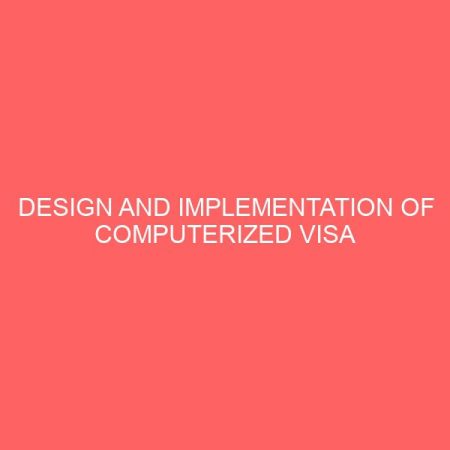

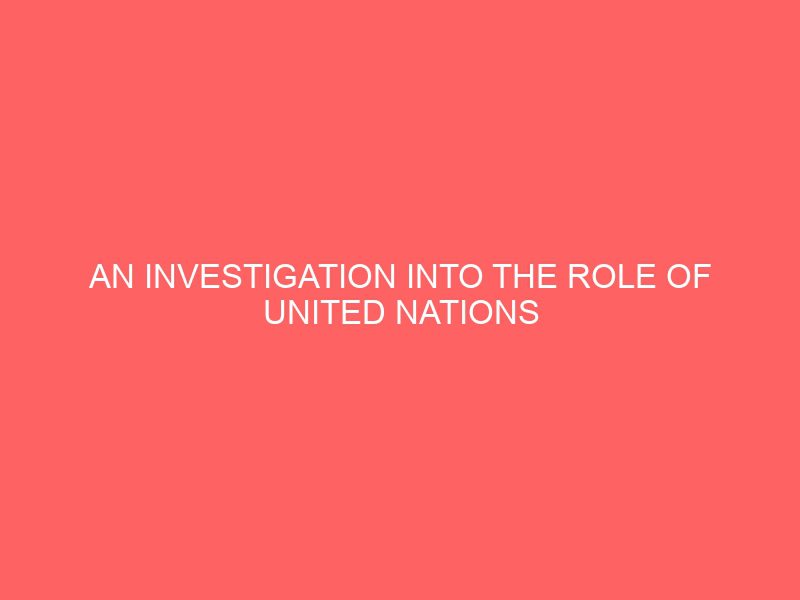
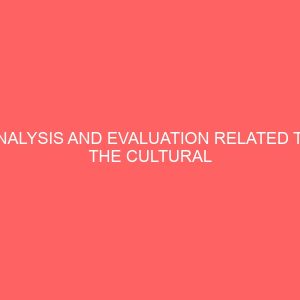
Reviews
There are no reviews yet.